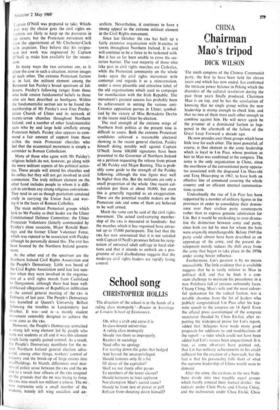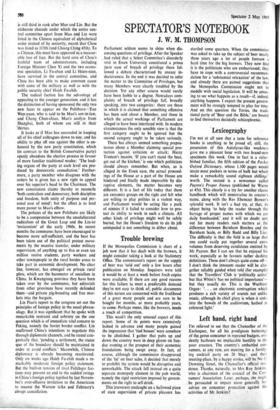Chairman Mao's tripod
CHINA DICK WILSON
The ninth congress of the Chinese Communist party, the first to have been held for eleven years and which has now ended, has confirmed the intricate power balance in Peking which the disorders of the cultural revolution during the past three years finally produced. Chairman Mao is on top, and he has the satisfaction of knowing that no single group within the new leadership is ,strong enough to check him, and that no two of them trust each other enough to combine against him. He will never again be the prisoner of a dominated faction as hap- pened in the aftermath of the failure of the Great Leap Forward a decade ago.
He now presides over three groups which have. little love for each other. The most powerful, of course, is that element in the army leadership which is loyal to Lin Piao, whose position as heir to Mao was confirmed at the congress. The army is the only organisation in China, since, the overthrow of the conventional party appara- tus associated with the disgraced Liu Shao-chi and Teng Hsiao-ping in 1967, to have both an effective line of command covering the whole country and an efficient internal communica- tions system.
Undoubtedly the rise of Lin Piao has been supported by a number of military figures in the. provinces in order to consolidate their domin- ance over their civilian party counterparts rather than to express genuine admiration for Lin. But it would be misleading to over-drama- tise the distinction between army and party, since both are led by men for whom the hats were originally interchangeable. Before 1949 the party could almost have been described as an appendage of the army, and the present de- velopment merely reduces the shift away from the army that began to take place in the 1950s under strong Soviet influence.
Furthermore, Lin's position is by no means unassailable. The little evidence that is available suggests that he is vastly inferior to Mao in political skill, and that he finds it a con- stant challenge to maintain -his precedence in a new Politburo full of envious unfriendly faces. Chiang Ching, Mao's wife and the most colour- ful spokesman for the radical faction, was a notable absentee from the list of leaders who publicly congratulated Lin Piao after his key- note speech to the congress on 14 April. Even the official press communique of the congress secretariat (headed by Chou En-lai), after re- porting the widespread praise for Lin's report, added that 'delegates have made many good proposals for additions to and modifications of the report'—a rider which could not have been added had Lin's stature been unquestioned. It is true, as some observers have pointed out, that Lin has military achievements to his credit sufficient for the creation of a hero-cult, but the fact is that his personality falls short of what the supreme leadership of China would seem to demand.
After the army, the civilians in the new Polit- buro divide into two roughly equal groups which hardly conceal their mutual dislike: the radicals under Chen Po-ta and Chiang Ching, and the technocrats under Chou En-lai. Chou is still third in rank after Mao and Lin. But the elaborate charade under which the entire cen- tral committee apart from Mao and Lin were listed in the Chinese equivalent of alphabetical order instead of by seniority, meant that Chou was listed as 113th (and Chiang Ching 45th). To a Chinese, this must have appeared as a measur- able loss of face. But the hard core of Chou's faithful team of administrators, including Foreign Minister Chen Yi and the two econo- mic specialists, Li Fu-chun and Li Hsien-nien, have survived in the central committee, and Chou has been able to make common cause with some of the military as well as with the public security chief Hsieh Fu-chih.
The radical faction has the advantage of appealing to the younger generation, and it has the distinction of having sponsored the only two new faces to appear on the Politburo—Yao Wen-yuan, who is said to be Mao's son-in-law, and Chang Chun-chiao, Mao's acolyte from Shanghai, both of whom are still in their 'thirties.
It looks as if Mao has succeeded in keeping all of his chief colleagues down to size, and his ability to play off one against the other is en- hanced by the new party constitution, which (in contrast to the British Conservative party) openly abandons the elective process in favour of more familiar traditional modes: The lead- ing organs of the party at each level are pro- duced by democratic consultation.' Further- more, a party member who disagrees with the orders he is given has a new right to appeal over his superior's head to the Chairman. The new constitution claims thereby to reconcile `both centralism and democracy, both discipline and freedom, both unity of purpose and per- sonal ease of mind'; but the effect is to lend more power to Mao's elbow.
The policies of the new Politburo are likely to be a compromise between the unadulterated radicalism of the Great Leap and the Liu-ist 'revisionism' of the early 1960s. In recent months the communes have been encouraged to become more self-sufficient, and the heat has been taken out of the political protest move- ments by the massive transfer, under military supervision, of anything up to five or even ten million restive students, party workers and other townspeople to the rural border areas to take part in economic development. No clear line, however, has emerged on private rural plots, which are the barometer of socialism in. China. In Kwangtung province they have been taken over by the communes, but editorials from other provinces have recently defended them—and private pig-breeding and free mar- kets into the bargain.
..in Piao's report to the congress set out the principles of foreign policy in the usual phrase- ology. But it was significant that he spoke with remarkable restraint and sobriety on the one question which is of immediate vital concern to Peking, namely the Soviet border conflict. Lin reaffirmed China's intentions to negotiate this through diplomatic channels, and he stated cate- gorically that, 'pending a settlement, the status quo of the boundary should be maintained in order to avoid conflicts.' Meanwhile, Chinese diplomacy is already becoming reactivated.
Only six weeks ago Hsieh Fu-chih made a re- markably moderate foreign policy statement.
But the built-in tension of rival Politburo fac-
tions may prevent an end to the sudden° swings in China's foreign policy typified by last Novem-
ber's over-effusive invitation to the Americans to resume the Warsaw talks and February's abrupt cancellation.



































 Previous page
Previous page